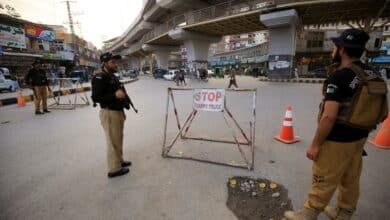A second chance at life for Afghan amputees

By Moncho Torres
Kabul, Dec 17 (EFE).- Many of the patients and staff at the orthopedic center of the International Committee of the Red Cross (ICRC) in Kabul limp to walk, but they walk.
They are among the 50,000 amputees rehabilitated by the ICRC in humanitarian work that the Taliban regime will not object to.
From the security guard at the entrance to the clerks and the superintendent, all the 815 employees of the seven ICRC orthopedic rehab centers in Afghanistan have some disability as a form of positive discrimination to serve as an example for the patients.
“Disabled working for disabled,” the director of the Kabul rehab center, Najmuddin Helal, told EFE in his office.
“(It shows) that life cannot be stopped, they can continue, they can do quite a lot. This is a good example for the others to follow when they have some vacancies they can employ disabled. But that is not easy at all,” Helal said.
The 57-year-old physiotherapist, who has been at the center since its inception three decades ago and needs to support himself with both hands to stand up, knows what he is talking about.
“I lost both my legs in a mine explosion when I was 18 in Kabul. I was actually driving a truck. Exactly, exactly today, at this moment 39 years ago,” Helal said.
The physiotherapist said that before getting a job at the center, he had to overcome many tough moments, when he felt useless without any hope of walking again as he remained locked up at home for five years, sitting idle.
“I call them ‘five black years’ of my life when I was at home. After that, I joined the ICRC,” he said, recalling how an opportunity came by after facing rejections at several other places.
Helal was wounded in December 1982 during the Soviet occupation of Afghanistan that lasted until 1989.
Then came the civil war, the Taliban regime between 1996 and 2001, the US invasion and finally, the return of the Islamist militia on Aug.15 this year.
The Taliban takeover scared off international organizations, which along with the cutting off of foreign funding and the blockade of aid, intensified the humanitarian crisis triggered by decades of war, the pandemic, and intense drought.
Among the 210,000 disabled people treated by the ICRC in the country since 1988, as evidenced by stacks of blue file folders containing patient records, many have been affected by the humanitarian crisis and have approached the center for help.
The center used to provide them with microcredit facilities to start their businesses but that has stopped due to a more pressing emergency.
Old patients are now seeking financial assistance to manage their lives to weather the crisis triggered by fund blockade.
It also gives emergency assistance to equip them for the harsh Afghan winter as the capital has already received the season’s first snowfall.
From an optimistic point of view, the return of the Taliban could also mean the end of four decades of war and subsequently a fewer number of conflict victims at the center.
But the physiotherapist is not so optimistic.
“This is so difficult to know, because during these 40 years of war, we always thought it would end. We help and we assist everybody who has a problem, who needs our assistance. For us, maybe it will not change much. Of course, we hope that the war will be over but so far it is very difficult to think that it is over, it is very difficult.”





